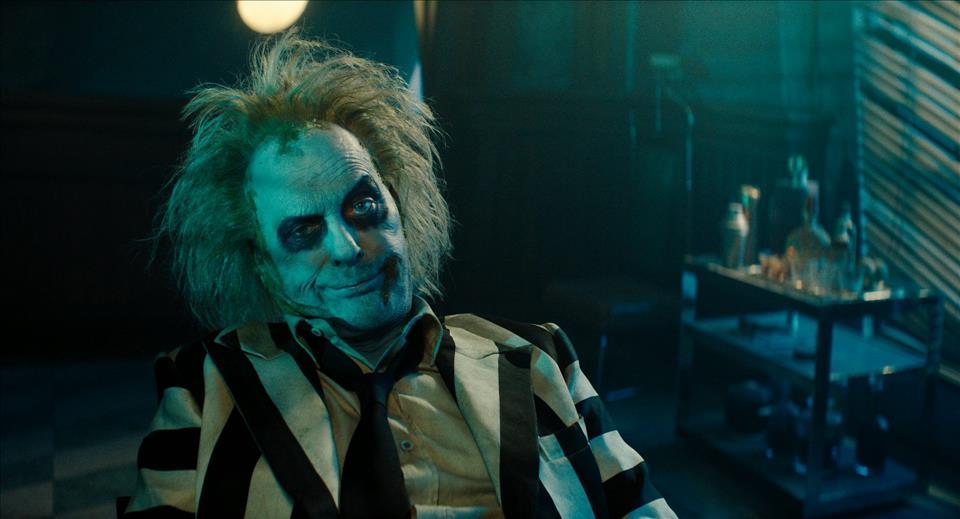
Beetlejuice Beetlejuice May Have Problems But It's Tim Burton's Best Film In Years
The film (along with the high school satire Heathers, released a month after Beetlejuice) helped make a name of then 16-year-old actress Winona Ryder, who played the Deetz family's psychic goth daughter. She is the only one able to see the ghosts and by the end of the film, finds herself caught up in a Faustian bargain with Beetlejuice, and must be saved from becoming his bride.
It's no surprise, given the current vogue for 1980s nostalgia (spurred initially by the success of Netflix series Stranger Things , which also stars Ryder) Burton has returned for a sequel – Beetlejuice Beetlejuice.
One way of reading the original film is as a satire of neoliberalism, in the dying days of the Reagan administration. The garrulous, pinstriped Beetlejuice is a supernatural conman, a rogue trader. His entrepreneurial status as a self-styled“bio exorcist”, and highly exaggerated fast-talking persona, can be seen to represent ungovernable capitalism. The film also deals with issues of gentrification and displacement in the conflict between the Maitlands and the Deetzes.
When we first meet Beetlejuice in the original film, he has cut himself loose from the bureaucratic ties and red tape of the afterlife administration and gone rogue. He is now operating for himself, unchecked and without restraint.
When we meet him again in Beetlejuice Beetlejuice, he's working in an afterlife call centre (oh how the mighty are fallen). The film is keenly aware of the passage of time, the distance from its parent film and its own status as something unearthed from the dead.
The 1988 film emerged out of the VHS era, an explosion of puppetry, stop motion animation mixed with live action, and blue screen effects. Beetlejuice Beetlejuice comes at us fully optimised for enormous digital IMAX screens. Everything about it is bigger, more expansive and more expensive. Not least in its depiction of the world of the dead, its landscape and its attendant rules and bureaucracy (something, I would argue, it borrows from Michael Powell's A Matter of Life and Death , 1946) are now much more fleshed out.
Nevertheless, reminders of the analogue days are scattered across the film. There's a Walkman belonging to an undead caretaker and a reference to the millennial preoccupation with vinyl . At one point, Beetlejuice appears in a mobile phone screen in the form of a series of dial-up internet porno“pop up” ads – a laugh-out-loud moment in the screening I attended.
The film is also replete with self-references and Burton Easter eggs. Danny DeVito (the Penguin to Keaton's Batman) makes a cameo appearance. Monica Bellucci plays Beetlejuice's 17th-century ex and is stitched back together a la Catwoman (1992) or Edward Scissorhands (1990). There are also a number of animated eye-popping moments, which deliberately recall“large Marge” from Pee-wee's Big Adventure (1985).
Winona Ryder and Justin Theroux in Beetlejuice Beetlejuice. Warner Bros. Entertainment Inc Return to the underworld
Like the original film, Beetlejuice Beetlejuice offers a series of brilliantly crafted set pieces. The original film's Banana Boat Song sequence (in which the yuppies are possessed during a dinner party and launch into a song and dance number) is massively and gloriously upscaled in the film's finale, this time using Richard Harris and Jimmy Webb's 1968 hit MacArthur Park. Another magnificent set piece fills in Beetlejuice's past life and demise in the style of a 1960s Mario Bava Italian horror film .
Yet despite these undoubtedly great moments, the film suffers from an attempt to do too much. While the 1988 original is taut and economic, Beetlejuice Beetlejuice has too many competing plot lines. And while they do coalesce in the final act, the film feels oddly-paced throughout. It has trouble balancing the more fantastical elements with family-oriented drama. This slows the pace down, particularly in depicting the relationship between Lydia Deetz, now a TV psychic, and her daughter Astrid (played by rising star Jenny Ortega).
Here, the film suffers from a similar problem to Ghostbusters: Afterlife (2021). In attempting to appeal to a younger audience as well as original fans of the film, its partial focus on teenage angst and drama (which the original film also incorporated but in a much more efficient and coherent way) sits awkwardly with the more anarchic and satirical moments. It means the film has something of an identity crisis.
That is not to say Beetlejuice Beetlejuice is at all bad – in fact it's Burton's best in quite some time. It's a visual feast, with digital effects that honour its stop motion origins and some superb visual gags (a personal favourite was the ghost of a man who died in a hot dog eating competition).
The film, however, again belongs to Michael Keaton, whose performance as Beetlejuice is even bigger and bolder than in the original. Keaton's role is much expanded, despite him claiming that a condition of his returning was to keep his presence to an effective minimum (a la the first film). Catherine O'Hara returns as pretentious artist stepmother Delia, but gone are the Maitlands who are brushed out of the narrative quickly (they“found a loophole and moved on”).
Geena Davis had refused to come back on the ground she is 40 years older now, and ghosts don't age. Beetlejuice meanwhile, has aged – but he's done so suitably disgracefully.
Looking for something good? Cut through the noise with a carefully curated selection of the latest releases, live events and exhibitions, straight to your inbox every fortnight, on Fridays. Sign up here .

Legal Disclaimer:
MENAFN provides the
information “as is” without warranty of any kind. We do not accept
any responsibility or liability for the accuracy, content, images,
videos, licenses, completeness, legality, or reliability of the information
contained in this article. If you have any complaints or copyright
issues related to this article, kindly contact the provider above.


















Comments
No comment